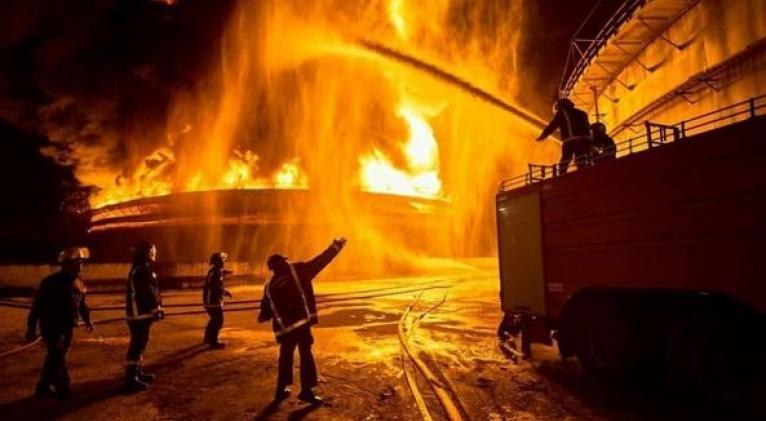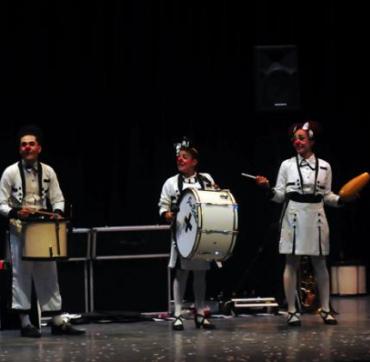Testimonials: A firefighter never quits
especiales

I remember both Pacheco and Vilma, his wife, linked to the Fire Department in Matanzas since I was a child. I know her since I was born. But I have not talked to him that much. But as soon as I watched the news about the supertankers oil depot fire, I thought of them.
I confess I first thought they would put me in contact with some other firefighters, but I never thought he himself was on the field, as he has been working on the Cuban Fire Protection Agency, not directly in the Fire Department.
As Israel Pachecho Matín told me, he has no obligations to be involved in any responsive layout in this sort of events. But once a firefighter, always a firefighter:
“I know all officers. I know all comrades. I got into the field where the tank was blazing out and suggested people on site to cover other positions as blazes were intense. We helped to move the fire hoses. We helped to pick up the device to attack the fire, including the specialized foam valves, and we positioned ourselves together with the other firefighters. We stayed in the area, we helped to organize the water attack for a tank, to work in the area, and we kept an eye on the fire to warn of any signs of what could actually happen."
I had called the Director of the company and the specialist who responds directly to the Fuel Marketing Company and they left for the Industrial Zone without overthinking: "We have a commitment with that entity and then, knowing that problem was big, we went there.
“We went there in a car. We entered the area, of course they let us pass because we are people who, from the engineering point of view, have a certain endorsement. We have gathered some amount of information about the problems of the fire safety."
We talked on the phone. I was here in Havana worried about all those beloved people there in Matanzas in possible danger. However, he was very calm even though he had just come out of that hell. He points out that he was going to tell me about his experience there, nothing official:
“The schemes were suggested, work was being done around the tank, and there was a first strong threat, which was not only the deformation of the tank, which had already been on fire for several hours. It is the red-wine tone the metal sheet of the tanks gets when this happens, but also the issue of the launch, the eruption of the tank as a result of the water vapor that generates a cushion due to the water content that these fuel tanks generally contain. We had to run to take shelter, there I had a small burn on my bald head —I am bald, to great credit—, so we ran, our comrades were saved, nothing happened, so we returned to our work plans.
“The tank began to deform. Deformation of this type of reservoir is generally inward. That is, get the idea of a plate that folds on itself and goes on the inside of the tank. That creates, of course, leak channels for the fuel. It's not the kind of fold as if you were folding a handkerchief, but it's metal and then it folds in a way that almost leads to fuel leakage.”
The tank already had a height of spent fuel at about six in the morning, the flames grew and so did the efforts to suffocate them. No one thought of leaving the place, no matter how unstable and risky it became:
“We spent the night there, with our colleagues from the ECCM, with lifeguards, with the Red Cross scheme and, well, we were working. That, from the point of view of work, was not something out of the ordinary for us, although that fire was something out of the ordinary, it was a Dantesque situation. It was really, really frightening, even for those of us who have gathered some experience.
"What happened? A large amount of fuel was launched into space at an incredible height. The tank then continued to deform and after nearly ten hours of being in combustion, a fuel spill occurred. The tank was never opened anywhere. It would have have created much bigger problems. We saw, we were there and we knew the tank spit a large release of fuel that, when it fell on the water that was already spilled by the work of the retaining wall itself, produced a wave, let's put it that way, a wave of fire that charged against our companions.”
The most serious damages occurred there, recalls Pacheco, who has received two Orders of Bravery granted by the Council of State, but he had never been in a situation like this:
"We escaped unharmed by a miracle thanks to my experience rather my wisdom, albeit with some burns. I lay down behind a support for the pipe of the ECCM's own water system and the wave of fire passed over me there. But since I was behind that concrete structure, well, I didn't touch me directly. I did have to curl up because the radiation was very strong and I estimate as an engineer that the temperature was around 250 or 300 Celsius degrees in that technical blow.”
His fifty years of experience saved him from the fire, but not from fear and consternation: “I was left alone at dawn, I did not know the fate of my two companions who were with me. Plain and simple, I lost sight of them and it scared the hell out of me, practically brought me to tears, and I walked around the battery that wasn't lit and returned around the back of the two tanks that were already on fire.
“I turned around. I was alone, not because of weakness, but because of impotence, seeing the cars burn and thinking what would have happened to my comrades. I cried there alone at night. I went to where I knew our forces were, practically in the entry line to the Base. I advised some colleagues from the Police Department to withdraw from the area because the tanks could continue to deform and create security problems. It was not safe to be there near the last tank. Somewhat with an authority that we no longer hold —I am no longer in the military—, we yelled at the ambulances not to come closer, that it was not possible to search for anyone in that sea of fire.
“The firefighters all the time showed a courage and determination that can be labeled as weird, especially under such powerful stress. It was weird that no one showed fear, in the sense that they stayed inside the heat zone, with the layers giving off steam because the radiation was intense, very intense. The place was very dangerous, horrible, hell on earth.”
How many years have you been working in this type of activity, in the fire department and later in the Agency? I ask him. “Practically my entire working life. Added to the 25 years I spent in the Ministry of the Interior, in addition to 23 years in the agency, I add almost half a century of work and studies.” I want to know if you have seen anything like that: "No, no, no, no... in all my experience as a firefighter, I've never seen anything like it."
Pacheco managed to reunite with his two comrades, injured but alive. However, it does not wipe away the pain in the voice when it comes time to talk about those who did not return, and why they remained in the midst of danger. He explains it to you and it is practically impossible for those who have never vibrated with the siren of the fire station:
“Everyone was involved there, colleagues from the Military Service, professionals from Cienfuegos, from the Juan Gualberto Gómez International Airport, from Santa Cruz, from the National Directorate. The headquarters of the Fire Department was deployed there, leading, controlling the operation so that no accidents occurred. There are things that happen, regardless of what can be foreseen. That is part of the innate courage of our colleagues; removing them from a life-threatening area often leads to an argument because they don't want to leave. When they notice that there are brothers who are not coming back, that they are losing them, it is harder to take them back, that's how we are."
His message to his brothers, who are still on the field, and to the people of Matanzas is clear: “You can count on Pacheco. Here we are. Matanzas be strong, as they say now, we have to move on."
Translated by Sergio A. Paneque Díaz / CubaSí Translation Staff














Add new comment